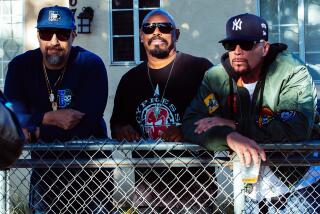TV Picks: Mule deer, ‘Mad Men,’ ‘The Address,’ ‘Ali,’ ‘Clarence’
- Share via
“Touching the Wild” (PBS, Wednesday). “That deer was willing to see me as an individual, and he very clearly saw that I granted him his individuality,” says naturalist Joe Hutto of the meeting that led to years spent becoming one with the mule deer of Wyoming. “I was not seeing something, I was seeing someone.” If any part of that sentence or this one -- “I don’t mind going beyond science, and I try to walk a fine line between the science and the sentiment; this is about making contact with the wild” -- seems wrong to you, you will want to stay far from this lovely film, presented as an episode of “Nature,” a companion to Hutto’s book “Touching the Wild: Living With the Mule Deer of Deadman Gulch.” Also the author of “Illumination in the Flatwoods,” which became the Emmy-winning “Nature” film “My Life as a Turkey,” Hutto has a talent for blending in -- wild chipmunks eat from his hands, birds settle upon his shoulders, deer give him a lick. Seasons change, at special-effect speed; the mule deer go here and there, individuals in a group their personalities define. There are helicopter shots. The usual circle-of-life caveats apply -- I looked away or sped through at times -- with the added challenge of neighboring humans, whom Hutto attempts to see through a deer’s eyes: “We must have always represented a conundrum of schizophrenic proportions: We’re that strange creature who’ll pull you as a helpless faun from the frozen water or cut you free from a tangled mass of barbed wire and then tomorrow kill your mother standing at your side and leave her gut piled in the sagebrush for you to ponder.”
PHOTOS: Preview the final season of ‘Mad Men’
“Mad Men” (AMC, Sundays). They’re back, with their funny clothes and haircuts and their unresolved issues, in a final season to be split into two, like “The Deathly Hallows,” but thankfully not into three, like “The Hobbit.”
“The Address” (PBS, Tuesday). Ken Burns in a different mode -- no Ken Burns effect, even. The Address in question is the one Abraham Lincoln gave at Gettysburg, but this is not the director’s usual languorous evocation/examination of an America past or an American pastime -- indeed, there is hardly any history in it at all. Rather, it is a mostly fly-on-the-wall documentary about the Greenwood School, a Vermont boarding school, “often a place of last resort,” whose students, boys ranging in age from 11 to 17 and subject to a range of “complex learning differences” (including dyslexia, ADHD and speech pathologies), study, memorize and publicly perform Lincoln’s great 272-word prose poem in order to focus their energies and elevate themselves. It is a school tradition, an optional “rite of passage” rewarded with a commemorative coin and intramural bragging rights. Burns lets the camera roll at length in classrooms and common rooms and every so often inserts an old photograph to advance the Civil War story, with narration read by a number of students; but mostly he just hangs around, which is all the subjects require. It’s an oddly homely, homemade sort of film, given Burns’ usual big-budget blockbusters, but (apart from a strangely random soundtrack) it suits the subject. Not, for the most part, sentimental, but heart-wrenching.
“The Trials of Muhammad Ali” (PBS, Monday). As one of the world’s most famous, controversial, admired and beloved men, Muhammad Ali has had his life documented and docudramatized many times over; the climactic portion of Bill Siegel’s film -- which finds the title-stripped champ in the Supreme Court, fighting for conscientious object status and his career -- was the subject of Stephen Frear’s dramatized “Muhammad Ali’s Greatest Fight,” which aired last fall on HBO. But Siegel’s film is unusually propulsive and evocative; he has chosen the right clips and clippings, the most artful and evocative photographs, talked to a range of people familiar (some intimately) with the subject, and put it all together to a sympathetic score by Chicago jazz stalwart Joshua Abrams. Presented by “The Independent Lens,” the film focuses on Ali’s spiritual journey and worldly trials, in the courts and the courts of public opinion, in both of which he was vindicated. (A clip from 1968 of TV presenter David Susskind calling Ali “a disgrace to his country, his race and what he laughingly describes as his profession ... a simplistic fool and a pawn,” is followed by footage of George W. Bush awarding him the Medal of Freedom.) Like boxing itself, a problematic sport that, nevertheless, produces many useful metaphors and instructive stories, Ali’s most troublesome times provide a way to think about ... us. “There are so many ways of looking at him that have only to do with us,” says one commentator, “that have nothing to do with him.”
PHOTOS: Stories that leapt from big to small screen (and vice versa)
“Clarence” (Cartoon Network, Mondays). Created by “Adventure Time” storyboard artist Skyler Page, who also voices the lead character, a sweet and doughy, happily unsophisticated elementary-school kid whose oddness does not cost him any friends. (He has odder friends, as it happens.) Perhaps not surprisingly, its look somewhat favors that of “Steven Universe,” from fellow “Adventure Time” alumna Rebecca Sugar, also on Cartoon Network. The setting is familiar yet mythic, mixing the ever-so-humble and the numinously Arcadian, as in childhood memory. There is a quotation from “Five Easy Pieces,” and Page has named David Byrne, Mark Twain, Alexander Payne and Mike White as influences. (It is also reminiscent of “The Adventures of Pete & Pete,” whose Will McRobb and Chris Viscardi are producing another crazy-tales-of-childhood animated adventure, “Sanjay & Craig,” over at Nickelodeon.) Sample dialogue: “I’m sorry I took your fries.” “I’m sorry I tried to kill you.” “That’s OK; it made it more fun, I guess.”
Twitter: @LATimesTVLloyd
More to Read
The complete guide to home viewing
Get Screen Gab for everything about the TV shows and streaming movies everyone’s talking about.
You may occasionally receive promotional content from the Los Angeles Times.







